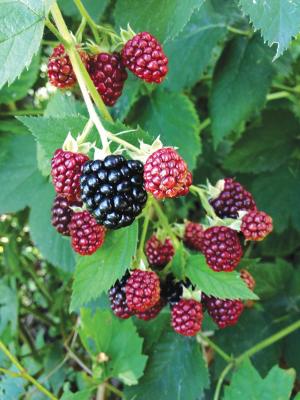Missouri Dewberries Being Researched
 ✖  |
Jeffrey Goss is on a mission to find the best dewberry stock growing in Missouri, and he hopes FARM SHOW readers can help him. Native to Missouri, the dark purple to black dewberry resembles a blackberry, though they’re smaller and grow on prickly brambles on trailing vines.
“Dewberries grow in places that are marginal for blackberries and raspberries, like hilly country such as the Ozarks,” Goss says.
He received Sustainable Agriculture Research and Education (SARE) funding to evaluate the productivity and winter hardiness of the three most widely available dewberries and develop crossbreeds with native varieties.
Goss has experience breeding persimmons and pawpaws to develop varieties for specialty crop markets.
“Dewberries can be eaten fresh. The seeds are smaller than blackberries, and the fruit can be made into jam, vinegar, and sometimes wine. In the 1800s, young shoots were eaten in the spring, like asparagus,” Goss says.
He’s looking for winter hardy varieties in northern Missouri and adjoining states that are nearly thornless and produce a lot of fruit. He invites people to contact him about native plants growing in their area.
His project objectives include developing cultivars suitable for production in marginal areas in economically depressed Missouri. He notes that dewberries also benefit pollinators and wildlife, and their root systems help stabilize the soil.
Contact: FARM SHOW Followup, Jeffrey Goss, P.O. Box 312, Hurley, Mo. 65675 (ph 417-708-7860).

Click here to download page story appeared in.
Click here to read entire issue
Missouri Dewberries Being Researched CROPS Miscellaneous Jeffrey Goss is on a mission to find the best dewberry stock growing in Missouri and he hopes FARM SHOW readers can help him Native to Missouri the dark purple to black dewberry resembles a blackberry though they’re smaller and grow on prickly brambles on trailing vines “Dewberries grow in places that are marginal for blackberries and raspberries like hilly country such as the Ozarks ” Goss says He received Sustainable Agriculture Research and Education SARE funding to evaluate the productivity and winter hardiness of the three most widely available dewberries and develop crossbreeds with native varieties Goss has experience breeding persimmons and pawpaws to develop varieties for specialty crop markets “Dewberries can be eaten fresh The seeds are smaller than blackberries and the fruit can be made into jam vinegar and sometimes wine In the 1800s young shoots were eaten in the spring like asparagus ” Goss says He’s looking for winter hardy varieties in northern Missouri and adjoining states that are nearly thornless and produce a lot of fruit He invites people to contact him about native plants growing in their area His project objectives include developing cultivars suitable for production in marginal areas in economically depressed Missouri He notes that dewberries also benefit pollinators and wildlife and their root systems help stabilize the soil Contact: FARM SHOW Followup Jeffrey Goss P O Box 312 Hurley Mo 65675 ph 417-708-7860
To read the rest of this story, download this issue below or click
here to register with your account number.







